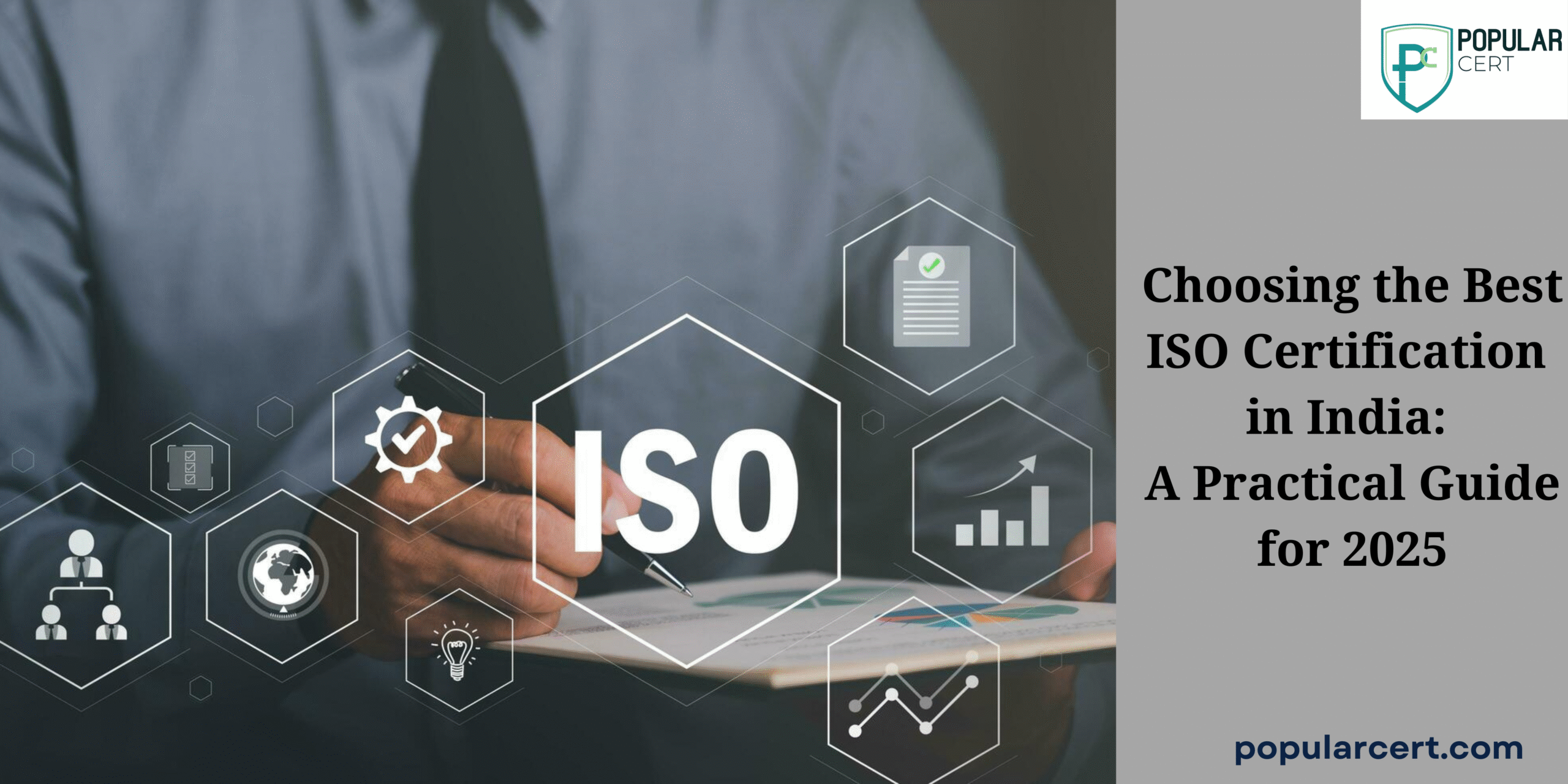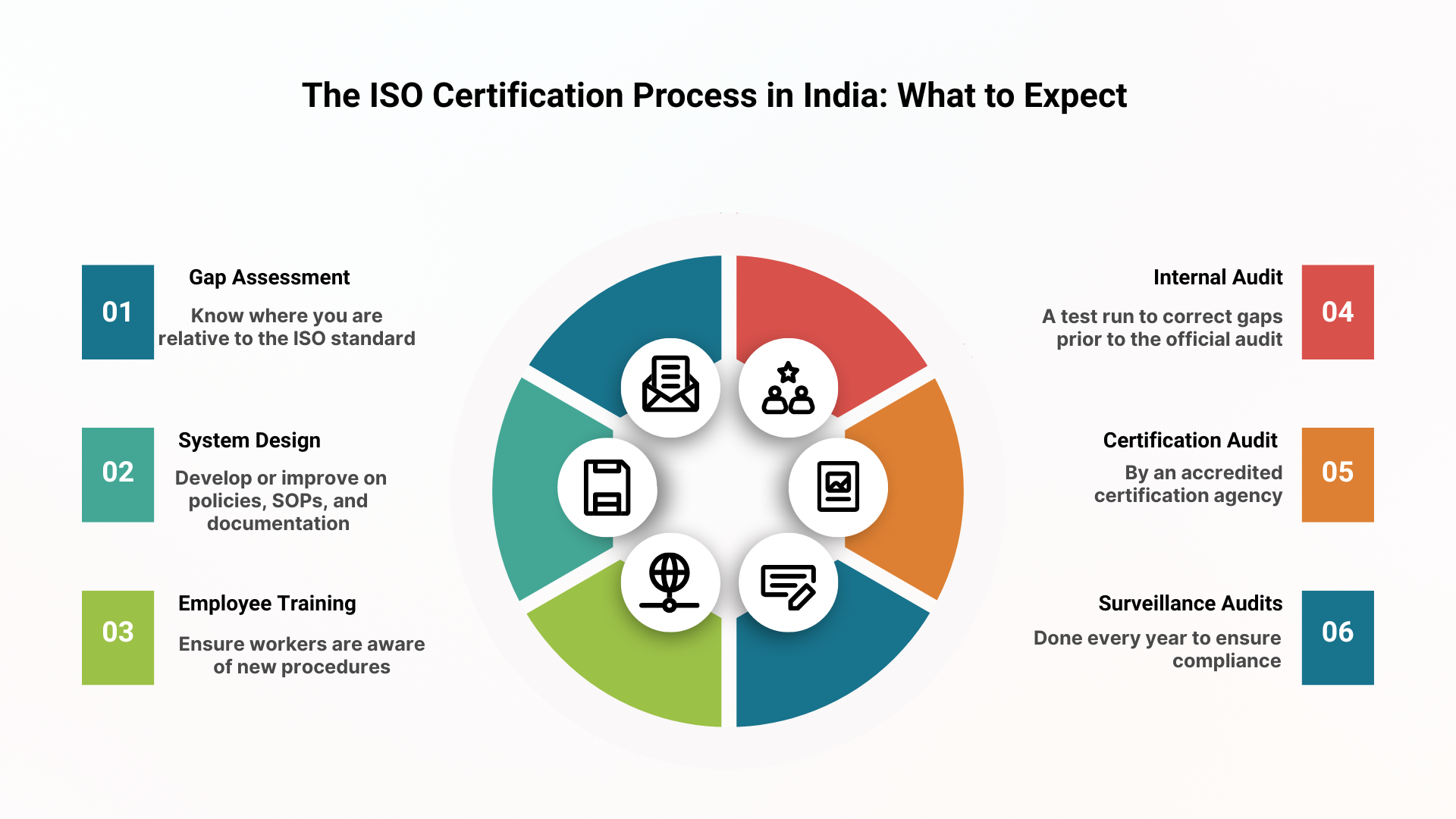Choosing the Best ISO Certification in India: A Practical Guide for 2025

As a business owner in India looking to remain competitive, secure contracts, or export overseas, you’ve likely asked yourself:
“What is the best ISO certification for my business?” It’s a question—and a frequent one. In India’s rapidly changing economic and regulatory landscape, ISO certification is more than a mere formality. It’s usually the difference-maker when clients, government agencies, or overseas buyers are deciding who to do business with. However, with several ISO standards out there—each focusing on something unique—determining the optimum one for your business may not be so obvious. This guide gets you through the confusion. Regardless of whether you own a technology startup in Pune, a food processing industry in Ahmedabad, or a textile export business in Surat, you will find out which ISO certification is best suited—and why.What Does "Best ISO Certification" Actually Mean in the Indian Context?
There is no one right answer about which ISO certification is best.
It all depends on what your business does, what kind of risks it’s likely to encounter, and what your customers are looking for.
In India, the “best” ISO certification is usually based on:
- Your sector and compliance obligations
- Client or government expectations
- Your business objectives—quality, safety, data, or environment
- Your growth plans—particularly export or large contracts
So, don’t leap into certification without first asking yourself:
What do I want this certification to help me do?
The Actual Advantages of Selecting the Appropriate ISO Certification in India
Aside from the certificate itself, these are what Indian companies actually benefit from:
- Increased client acceptance both locally and abroad
- Improved internal processes to cut down on mistakes and enhance productivity
- Increased tenders won and become a preferred supplier
- Enhanced brand image as a serious, quality-oriented business
- Adherence to Indian and international regulations—particularly with regard to data, safety, and the environment
Think of ISO as an intelligent business investment—not simply a formality.
Types Of Certification
- ISO Certification
- ISO 9001 Certification
- ISO 14001 Certification
- ISO 45001 Certification
- ISO 22000 Certification
- ISO 27001 Certification
- ISO 17025 Certification
- ISO 13485 Certification
- ISO 20000-1 Certification
- ISO 22301 Certification
- ISO 50001 Certification
- ISO 37001 Certification
- IATF 16949 Certification
- ISO 29001 Certification
- ISO 31000 Certification
- ISO 20121 Certification
- ISO 10002 Certification
- ISO 41001 Certification
Get Free Consultation
Our Clients


















Most Popular ISO Certifications in India (And What They're Best For)
Here’s a rundown of the most popular ISO certifications Indian businesses implement—and what each is best for.
- ISO 9001 – Quality Management System
Best For: Nearly all industries—particularly manufacturing, trading, logistics, healthcare, education, and services.
Why It’s Popular:
It’s the gold standard for quality. ISO 9001 helps organizations streamline processes, reduce waste, and deliver consistent service. It’s also frequently required in government tenders and vendor onboarding processes.
Who Needs It:
If you’re working with clients, vendors, or regulators—this is the foundational certification you’ll likely need.
- ISO 14001 – Environmental Management System
Best For: Construction, chemicals, infrastructure, energy, plastics, and manufacturing.
Why Indian Companies Choose It:
Indian environmental regulations are becoming more stringent. ISO 14001 assists you in remaining compliant with pollution laws, decreasing your environmental impact, and achieving sustainability goals—essential if you need to work with eco-friendly customers or government agencies.
- ISO 22000 / FSSC 22000 – Food Safety Management
Best For: Food processors, exporters, cold chain logistics, agriculture, hotels, and restaurant chains.
Why It’s Essential:
India is an exporter of food, but the level of standards that international buyers are looking for is increasing. ISO 22000 helps your entire supply chain adhere to food safety standards. It also syncs well with FSSAI regulations, making you competitive in the local and international markets.
- ISO 27001 – Information Security Management
Best For: IT services, BPOs, SaaS firms, fintech startups, and cloud service providers.
Why Indian Tech Companies Need It:
In India’s digital economy, data security is a priority. ISO 27001 enables businesses to safeguard sensitive information, minimize the chances of a breach, and comply with cybersecurity demands—particularly from international clients in Europe, America, or Australia.
- ISO 45001 – Occupational Health & Safety Management
Best For: Construction, oil & gas, mining, engineering, and heavy industries.
Why It’s Gaining Popularity:
Safety of workers is coming under more scrutiny, particularly for businesses dealing in infrastructure or manpower-intensive activities. ISO 45001 minimizes workplace accidents, complies with legal conditions, and fosters confidence with clients and employees.
- ISO 50001 – Energy Management System
Best For: Power plants, cement, steel, glass, textile, and other energy-consuming industries.
Why Indian Industries Choose It:
Increasing energy prices and regulatory pressure to reduce emissions are compelling companies to implement energy management systems. ISO 50001 reduces energy consumption, enhances efficiency in operations, and supports sustainability objectives.
How to Choose the Best ISO Certificate for Your Company in India
Here’s a quick guideline to keep in mind while selecting an ISO standard:
Step 1: Map It to Your Industry
Begin by knowing what ISO standards are most prevalent in your industry. For instance:
- Tech industry? ISO 27001
- Food manufacturing? ISO 22000 or FSSC 22000
- Export or manufacturing? ISO 9001 is practically always required
Step 2: Know What Your Clients Want
Certain customers (particularly international or government clients) require certain ISO certifications as a condition of their purchasing conditions. Always inquire or refer to tender documents.
Step 3: Determine Your Internal Priorities
Need better product quality? Use ISO 9001
Interested in reducing accidents? opt for ISO 45001
Want to reduce waste or emissions? ISO 14001 or ISO 50001 is the solution
Step 4: Get an ISO Expert
A seasoned consultant can align your organization’s needs with the most appropriate standard, support implementation, and assist you in preparing for the certification audit.
The ISO Certification Process in India: What to Expect
The certification process is quite sequential:

Who Can Issue ISO Certification in India?
International Organization for Standardization (ISO), does not issue certificates. It is issued by accredited third-party agencies.
In India, seek:
- NABCB-accredited certification bodies (National Accreditation Board for Certification Bodies)
- International certification agencies if you’re dealing with foreign clients
Avoid shortcuts or brokers offering “fast-track” ISO certificates without audits—it’s not legally valid and can backfire during client reviews or tenders.
Ready to Implement ISO Certification?
Whether you want to comply with tender requirements, attract conscious customers, or reduce your operational costs, Popularcert gives you the system to do it right.
And the right consultant can make the journey clear, fast, and future-proof.
Popularcert is here to help businesses lead the way in sustainable operations.
Contact us today to schedule a free consultation and start your journey to ISO certification.
GET A FREE CONSULTATION NOW
FAQ
Is ISO certification mandatory in India?
No—but it’s often required for tenders, exports, and B2B deals. Many businesses treat it as essential to remain competitive.
Can a micro or small business get ISO certified?
Yes. ISO standards are scalable for any business size. MSMEs in India, for instance, use it to establish credibility and qualify for larger opportunities.
What's the most widely utilized ISO certification in India?
The most prevalent is ISO 9001 (Quality Management), then ISO 14001, ISO 22000, and ISO 27001.
How long does certification take?
Usually 3–6 weeks after your preparation and company size.
Can I get more than one ISO certificate?
Yes. Indian companies often bundle certifications—such as ISO 9001 + 14001 + 45001—to address client or regulation requirements more effectively.
